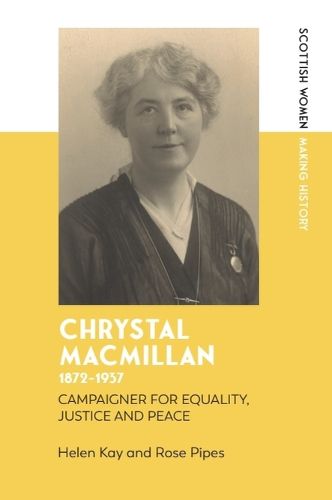Readings Newsletter
Become a Readings Member to make your shopping experience even easier.
Sign in or sign up for free!
You’re not far away from qualifying for FREE standard shipping within Australia
You’ve qualified for FREE standard shipping within Australia
The cart is loading…






This historical biography of Chrystal Macmillan, one of Scotland's most prominent campaigners for women's equality, justice and peace in the early twentieth century, is the first account of her life and work. It describes her early life in a comfortable home in Edinburgh, her school and university years in Scotland, and her rise to prominence as the main appellant in the 'Scottish Women Graduates' Case' when it went to appeal in the House of Lords. She was an important figure in the suffrage movement both in Scotland, and in England where she lived from 1913, becoming influential in several national and international women's organisations. She used her legal skills and training to scrutinise, draft and suggest amendments to legislation that had direct impact on women's lives, including their right to their own nationality, to become members of the legal profession and to be treated equally with men in the workplace. In 1915 she was an organiser of the International Women's Congress at The Hague, which urged political leaders to use mediation to stop the war. In 1924, she qualified as a barrister in London and was active on the Western Circuit and London courts. Although she left no diary, the recollections of friends, obituaries and memorials provide a vivid image of a woman of considerable ability, commitment and courage.
$9.00 standard shipping within Australia
FREE standard shipping within Australia for orders over $100.00
Express & International shipping calculated at checkout
This historical biography of Chrystal Macmillan, one of Scotland's most prominent campaigners for women's equality, justice and peace in the early twentieth century, is the first account of her life and work. It describes her early life in a comfortable home in Edinburgh, her school and university years in Scotland, and her rise to prominence as the main appellant in the 'Scottish Women Graduates' Case' when it went to appeal in the House of Lords. She was an important figure in the suffrage movement both in Scotland, and in England where she lived from 1913, becoming influential in several national and international women's organisations. She used her legal skills and training to scrutinise, draft and suggest amendments to legislation that had direct impact on women's lives, including their right to their own nationality, to become members of the legal profession and to be treated equally with men in the workplace. In 1915 she was an organiser of the International Women's Congress at The Hague, which urged political leaders to use mediation to stop the war. In 1924, she qualified as a barrister in London and was active on the Western Circuit and London courts. Although she left no diary, the recollections of friends, obituaries and memorials provide a vivid image of a woman of considerable ability, commitment and courage.